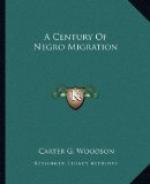The movement to the West Indies was accelerated by other factors. After the emancipation in those islands in the thirties, there had for some years been a dearth of labor. Desiring to enjoy their freedom and living in a climate where there was not much struggle for life, the freedmen either refused to work regularly or wandered about purposely from year to year. The islands in which sugar had once played a conspicuous part as the foundation of their industry declined and something had to be done to meet this exigency. In the forties and fifties, therefore, there came to the United States a number of labor agents whose aim was to set forth the inviting aspect of the situation in the West Indies so as to induce free Negroes to try their fortunes there. To this end meetings were held in Baltimore, Philadelphia, New York and Boston and even in some of the cities of the South, where these agents appealed to the free Negroes to emigrate.[l4]
Thus before the American Colonization Society had got well on its way toward accomplishing its purpose of deporting the Negroes to Africa the West Indies and British Guiana claimed the attention of free people of color in offering there unusual opportunities. After the consummation of British emancipation in those islands in 1838, the English nation came to he regarded by the Negroes of the United States as the exclusive friend of the race. The Negro press and church vied with each other in praising British emancipation as an act of philanthropy and pointed to the English dominions as an asylum for the oppressed. So disturbed were the whites by this growing feeling that riots broke out in northern cities on occasions of Negro celebrations of the anniversary of emancipation in the West Indies.[l5]
In view of these facts, the colonizationists had to redouble their efforts to defend their cause. They found it a little difficult to make a good case for Liberia, a land far away in an unhealthy climate so much unlike that of the West Indies and British Guiana, where Negroes had been declared citizens entitled to all privileges afforded by the government. The colonizationists could do no more than to express doubt that the Negroes would have there the opportunities for mental, moral and social betterment which were offered in Liberia. The promoters of the enterprise in Africa did not believe that the West Indian planters who had had emancipation forced upon them would accept blacks from the United States as their equals, nor that they, far from receiving the consideration of freedmen, would be there any more than menials. When told of the establishment of schools and churches for the improvement of the freedmen, the colonizationists replied that schools might be provided, but the planters could have no interest in encouraging education as they did not want an elevated class of people but bone and muscle. As an evidence of the truth of this statement it was asserted that newspapers of the country were filled with disastrous accounts of the falling off of crops and the scarcity of labor but had little to say about those forces instrumental in the uplift of the people.[16]




